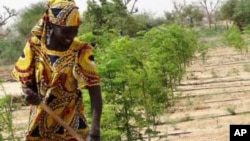A new report says women are suffering domestic violence at “alarming levels and with shocking frequency” in post-conflict countries in West Africa.
The report, released Tuesday by the U.S.-based International Rescue Committee, says domestic violence is the “primary threat to women” in countries, like Ivory Coast, Liberia, and Sierra Leone, which are rebuilding after years of internal strife.
Report co-author Heidi Lehmann said women in these countries face special risks, even though domestic violence is pervasive across the globe. “It is not specific to countries coming out of war,” she said. “What conflict does, though, is increase women’s vulnerability to violence, and that includes domestic violence.”
The IRC says nearly two-thirds of the women who come to them for assistance after suffering violence report that they were attacked by their partners or spouses.
Lehmann, IRC’s director of Women’s Protection and Empowerment, said the issue is not getting enough attention in the region.
“What we’d like to see is that domestic violence is recognized as a humanitarian issue standing in the way of women’s empowerment, in a region, West Africa, where women’s leadership is so desperately needed,” Lehmann said.
The IRC says domestic violence is often considered a “private matter” or part of a cultural practice. The report says a contributing factor in West Africa is that men are often in control of all the household income, and women in abusive homes get beaten when asking for food or money.
Lehmann argues the violence cannot be excused by culture. “I think domestic violence is pervasive everywhere, and oftentimes we say it is a matter of culture,” she said. “But the fact that domestic violence is so common in practically every country that you go to speaks to the root cause of domestic violence, which is the subordinate status of women.”
Sierra Leone has recently passed a law criminalizing domestic violence, a development Lehmann said is promising. “I think it has helped, in terms of Sierra Leone recognizing that abusing women in their homes is actually a crime,” she said.
But she said a law is not enough: “What’s going to help even more is making sure that that law is applied uniformly so that the police are able to take action, that women feel comfortable going to the police and that all aspects of the law are fully implemented.”
She added that the IRC hopes other countries will follow Sierra Leone’s example. “One of our clear recommendations is for [Liberia] to pass legislation that would criminalize domestic violence. And I think that is something that the Liberian government seemed very open to considering.”
To gather data for the report, “Let Me Not Die Before My Time: Domestic Violence in West Africa,” the IRC said it drew from ten years of working in the region, including statistics on what women say when they come in for medical or counseling support, as well as from interviews asking women what they think about the issue.
The report, released Tuesday by the U.S.-based International Rescue Committee, says domestic violence is the “primary threat to women” in countries, like Ivory Coast, Liberia, and Sierra Leone, which are rebuilding after years of internal strife.
Report co-author Heidi Lehmann said women in these countries face special risks, even though domestic violence is pervasive across the globe. “It is not specific to countries coming out of war,” she said. “What conflict does, though, is increase women’s vulnerability to violence, and that includes domestic violence.”
The IRC says nearly two-thirds of the women who come to them for assistance after suffering violence report that they were attacked by their partners or spouses.
Lehmann, IRC’s director of Women’s Protection and Empowerment, said the issue is not getting enough attention in the region.
“What we’d like to see is that domestic violence is recognized as a humanitarian issue standing in the way of women’s empowerment, in a region, West Africa, where women’s leadership is so desperately needed,” Lehmann said.
The IRC says domestic violence is often considered a “private matter” or part of a cultural practice. The report says a contributing factor in West Africa is that men are often in control of all the household income, and women in abusive homes get beaten when asking for food or money.
Lehmann argues the violence cannot be excused by culture. “I think domestic violence is pervasive everywhere, and oftentimes we say it is a matter of culture,” she said. “But the fact that domestic violence is so common in practically every country that you go to speaks to the root cause of domestic violence, which is the subordinate status of women.”
Sierra Leone has recently passed a law criminalizing domestic violence, a development Lehmann said is promising. “I think it has helped, in terms of Sierra Leone recognizing that abusing women in their homes is actually a crime,” she said.
But she said a law is not enough: “What’s going to help even more is making sure that that law is applied uniformly so that the police are able to take action, that women feel comfortable going to the police and that all aspects of the law are fully implemented.”
She added that the IRC hopes other countries will follow Sierra Leone’s example. “One of our clear recommendations is for [Liberia] to pass legislation that would criminalize domestic violence. And I think that is something that the Liberian government seemed very open to considering.”
To gather data for the report, “Let Me Not Die Before My Time: Domestic Violence in West Africa,” the IRC said it drew from ten years of working in the region, including statistics on what women say when they come in for medical or counseling support, as well as from interviews asking women what they think about the issue.






